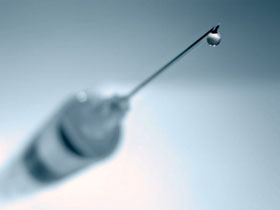Poor countries have limited access to H1N1 flu vaccine
China has become the first country in the world to publish a successful clinical trial of human influenza A / H1N1 vaccine. Since the outbreak of A / H1N1 flu and becoming a global pandemic, a race against time has taken place in many countries, many pharmaceutical companies around the world to quickly find vaccine to prevent the disease. This danger.
Chinese Minister of Health Tran Chuc said the results of clinical trials on 1,614 volunteers from 3 years of age to adulthood showed that an immune response to the influenza A / H1N1 virus appeared in all people. volunteer. The experiment was conducted on August 15, and according to Chinese scientists, just one injection is enough.

(Artwork: Trendsupdates)
With this success, Chinese authorities hope that from now until the end of October, all people at high risk of infection will be given priority to vaccinate the vaccine.
Vaccine production is one of the top priorities of the campaign to combat influenza A / H1N1 since the outbreak of this dangerous disease last April and continues to spread strongly. Since May, the World Health Organization (WHO) has provided standard samples for some countries to study the preparation of vaccines against influenza A / H1N1 virus, Australia is the first country in the world to test vaccine room. H1N1 flu in people on July 22. And this August saw massive tests in many countries: England, America, Germany . Canada announced, will start the nationwide vaccination campaign in November.
The technology of producing A / H1N1 flu vaccine has made significant progress over the past time, but the latest progress is that nanotechnology can help shorten the time from 5-6 months by the traditional method down. less than 3 months. However, the current concern is the imbalance in access to new vaccine resources, such as Asia, which is one-third of the world's population, but 90% of production. World-wide flu vaccines are concentrated in Europe and the United States. This problem is even more pressing in developing countries, where there is not enough budget to buy vaccines from major pharmaceutical companies.
Margaret Chan, the World Health Organization's (WHO) general director, said: ' Poverty will hinder poor countries from accessing the influenza A / H1N1 vaccine, because pharmaceutical companies tend to focus only. produce new vaccines for rich countries '.
In a recommendation just released last week, the WHO has warned of the "overload" of orders for vaccines against influenza A / H1N1. Since WHO is not a funding agency, the organization's effort is being made in the direction of calling pharmaceutical companies to contribute at least 10% of new vaccine production, or selling it at lower prices to countries. poor. WHO has also called on China to share its success.
Mr. Shin Young-soo, WHO Western Pacific Regional Director: " We will welcome a fair distribution initiative of this vaccine to support poor and developing countries from the Chinese Government. " .
However, the WHO notes, although the need for vaccines is very urgent and the testing has not been conducted long and widely, it is still necessary to improve the safety and quality of the vaccine. WHO also recommends that countries continue to test when the vaccine begins to be used. According to the latest statistics, the number of people infected with influenza A / H1N1 virus worldwide has so far surpassed 250,000, of which more than 2,500 people were killed.
- WHO: A dose of vaccine against influenza A / H1N1 will reach $ 20
- Vaccination against H1N1 can cause neurological disorders
- New hope for A / H1N1 flu vaccine
- A / H1N1 virus spread due to ... negligence in vaccine manufacturing?
- Australia prepares vaccine for influenza A / H1N1
- He gave 'standard' people the vaccine for A / H1N1 flu
- New influenza A / H1N1 vaccine: There is no less concern
- Novartis began testing the A / H1N1 flu vaccine
- Influenza A / H1N1: Only 1 dose of vaccine is needed
- 9X invented a refrigerator that can save 1.5 million people every year
- WHO is concerned about side effects from China's H1N1 vaccine
- USA: Vaccination against influenza A / H1N1 is free for people
 Green tea cleans teeth better than mouthwash?
Green tea cleans teeth better than mouthwash? Death kiss: This is why you should not let anyone kiss your baby's lips
Death kiss: This is why you should not let anyone kiss your baby's lips What is salmonellosis?
What is salmonellosis? Caution should be exercised when using aloe vera through eating and drinking
Caution should be exercised when using aloe vera through eating and drinking